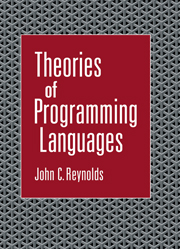Book contents
- Frontmatter
- Contents
- Preface
- 1 Predicate Logic
- 2 The Simple Imperative Language
- 3 Program Specifications and Their Proofs
- 4 Arrays
- 5 Failure, Input-Output, and Continuations
- 6 Transition Semantics
- 7 Nondeterminism and Guarded Commands
- 8 Shared-Variable Concurrency
- 9 Communicating Sequential Processes
- 10 The Lambda Calculus
- 11 An Eager Functional Language
- 12 Continuations in a Functional Language
- 13 Iswim-like Languages
- 14 A Normal-Order Language
- 15 The Simple Type System
- 16 Subtypes and Intersection Types
- 17 Polymorphism
- 18 Module Specification
- 19 Algol-like Languages
- Appendix: Mathematical Background
- Bibliography
- Index
18 - Module Specification
Published online by Cambridge University Press: 28 January 2010
- Frontmatter
- Contents
- Preface
- 1 Predicate Logic
- 2 The Simple Imperative Language
- 3 Program Specifications and Their Proofs
- 4 Arrays
- 5 Failure, Input-Output, and Continuations
- 6 Transition Semantics
- 7 Nondeterminism and Guarded Commands
- 8 Shared-Variable Concurrency
- 9 Communicating Sequential Processes
- 10 The Lambda Calculus
- 11 An Eager Functional Language
- 12 Continuations in a Functional Language
- 13 Iswim-like Languages
- 14 A Normal-Order Language
- 15 The Simple Type System
- 16 Subtypes and Intersection Types
- 17 Polymorphism
- 18 Module Specification
- 19 Algol-like Languages
- Appendix: Mathematical Background
- Bibliography
- Index
Summary
In constructing a large program, it is vital to be able to divide the program into parts, often called modules, and to specify these modules with sufficient precision that one can program each module knowing only the specification of the other modules.
One of the main benefits of modern type theory is the realization that the type of a module is in fact a formal specification of the module. Indeed (although we will not discuss them in this book) there are implemented type-based systems such as NuPrl and Coq which can handle specifications of functional programs that are as expressive and flexible as the specifications of imperative programs in Chapter 3. As with the specifications of Chapter 3, however, considerable human assistance is needed to insure that a program meets its specification.
In this chapter, we will examine more limited systems for which the check that a module meets its specification can be performed efficiently and without human intervention. What is surprising is the extent to which these less expressive systems can still detect programming errors.
We begin with a discussion of type definitions, especially abstract type definitions that make it possible to separate the definition of an abstract type, including both its representation and the relevant primitive operations, from the part of the program that uses the abstract type but is independent of its representation and the implementation of the primitives. We then examine a more general approach based on existentially quantified types and polymorphic functions.
Information
- Type
- Chapter
- Information
- Theories of Programming Languages , pp. 398 - 414Publisher: Cambridge University PressPrint publication year: 1998
